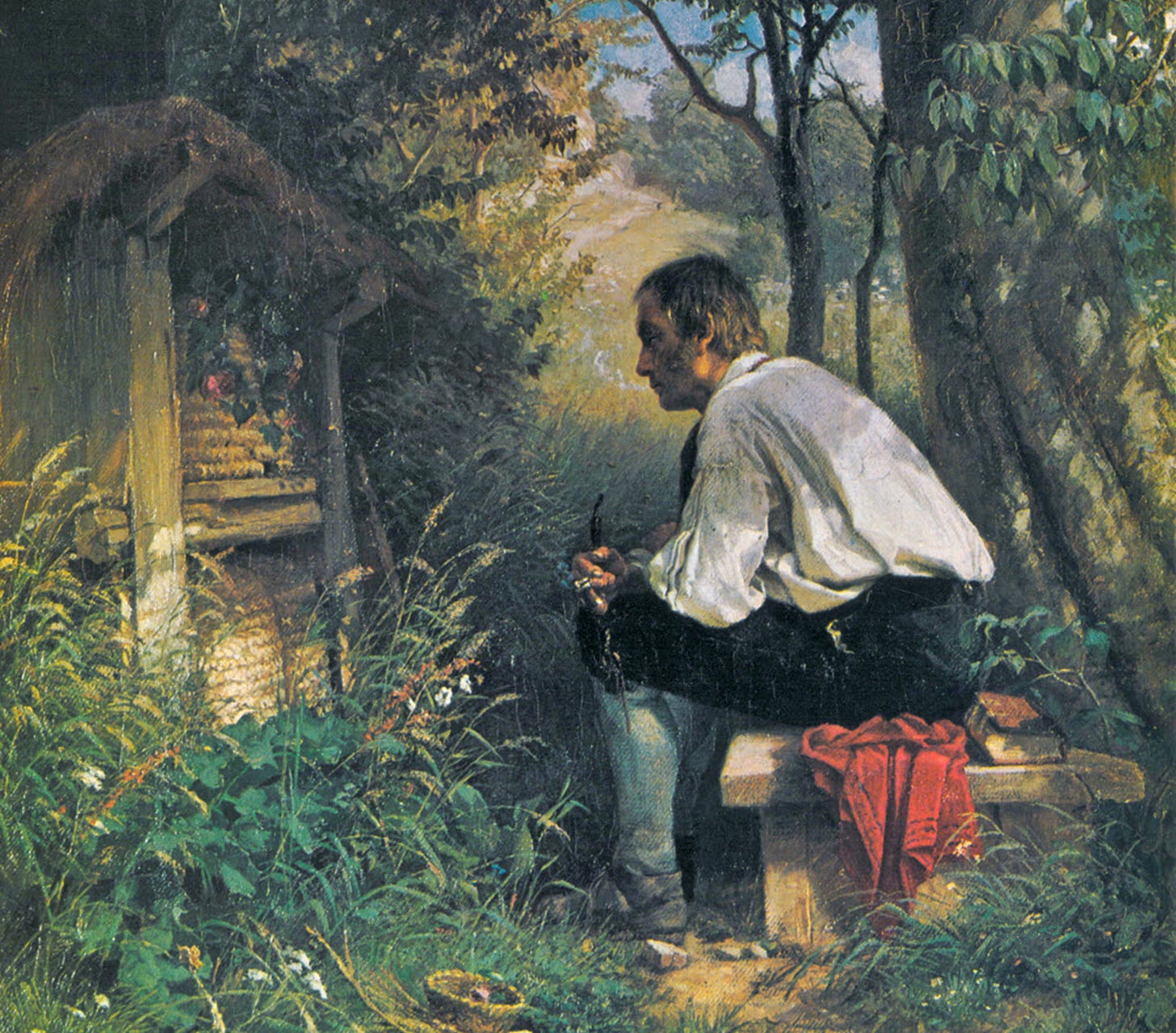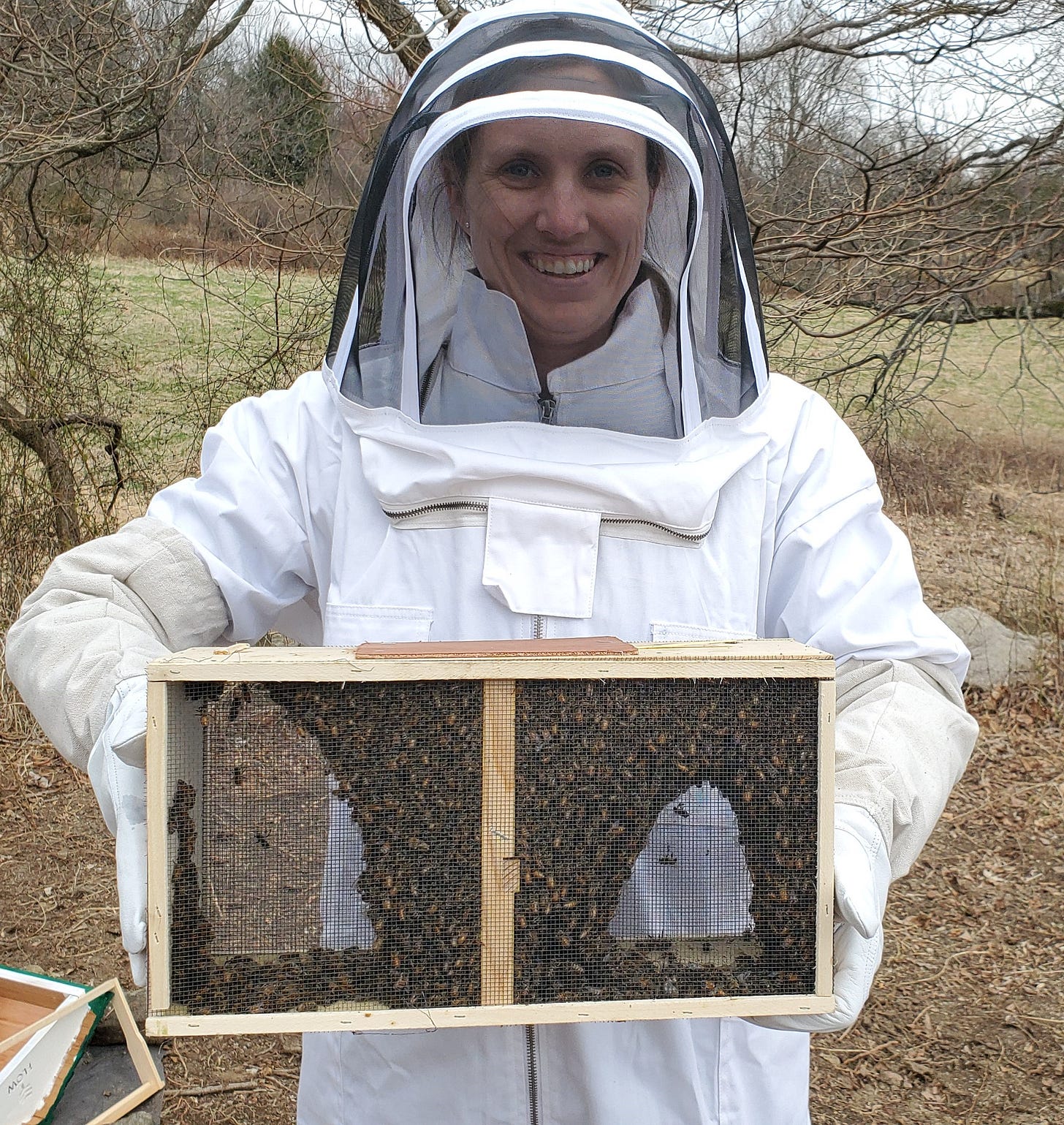
“The keeping of bees is like the direction of sunbeams”- Henry David Thoreau
My family moved to a hobby farm a few years ago and I began keeping bees.
I won’t bore you with the in-depth details of hive inspections, brood patterns, queen mating, swarm control and mite management. That’s before you even get to harvesting honey! I could go on for hours about apiary methodologies. But this isn’t a post about honeybee maintenance or even why beekeeping is essential for our ecosystems.
It’s about the spiritual practice of beekeeping and how those lessons might apply to you.

Experiential Learning
There’s a lot to learn if you want to keep bees. To prepare I read books, took a course at my state’s agricultural extension office and joined a local beekeeper’s organization, all before I got my first hive. I learned a lot of facts about beekeeping and felt like I had a decent grasp on the basics. But that was nothing compared to installing my first package of live bees who seem way angrier than any of the books described. This was another reminder that the deepest learning is experiential. You can glean some data from books, but it is not until you are doing the work that you get a sense of how to keep bees. At some point you must face your fears and try it out. I had so many questions that I couldn’t answer until I was in my suit with bees all over me. Will the hive boxes be heavy? (yes). Will I be able to find the queen bee? (no) Will I get stung? (yes, many times)
Beekeeping is both an art and a science. There are concrete facts, but there are so many things you can only learn as you go. Following hunches you may have, engaging in trial and error, and allowing for surprise and heartache.
The fear I had the first time I interacted with my bees is probably akin to how my chaplaincy interns feel during their first patient visits. In my chaplaincy internship program, I give students some informational learning the first week during orientation. They learn the necessary components crucial to their daily work: how to chart in the electronic medical record, how to respond to emergencies and how to make referrals to other disciplines in the hospital. However, the real learning comes when they are sitting with patients for the first time. I can give them endless lectures about listening, prayer, emotions and loss, but they only truly learn it by being the chaplain in the room.
The deepest source of knowledge for so many endeavors is experiential learning. We learn by doing the work. We learn by making mistakes and reflecting on them. This is how we learn to be a parent, to be in relationship with others, to do our jobs, to be in the world. Allowing ourselves to be students of something new increases our depth of understanding of the world. There is also a tremendous humility of not being an expert in something and fumbling through learning as we go.
What are you a student of right now?
Community Based
Ask three beekeepers their opinion on a beekeeping technique and you’ll get five answers. This is related to having varied experiences as noted above, but also because sometimes there is no definitive right/wrong way to do something. The community can be a source of wisdom as well as resource sharing.
I suspect beekeeping associations sprung up because people in beekeepers’ lives didn’t want to hear all the minutiae of this hobby and so we had to seek out others who are interested in talking about bees for hours on end. The social component is significant. The individuals I met through beekeeping are not people I would have otherwise gotten to know. We are of different generations, occupations and political backgrounds, with one uniting force. And people are surprisingly generous. When I was starting out and posed a question about something going on with my hive, another woman (named Christine!) drove 30 minutes to my house to do a hive inspection with me. People want to help you succeed. Just as it takes a village to raise a child, it can take a village to raise bees.
We are increasingly isolated as a society and some cite loneliness as endemic to our current times. Additionally, we all experienced loss of relationships and community during Covid and might have yet to fully recover relationships from that time. We were created to be in community. We are meant to connect with others. Sometimes we don’t know how or are so busy it doesn’t occur to us that our relationships might be lacking. We also need to engage with others who will force us outside our comfort zone (a place I don’t always want to go, staying in an echo chamber is easier). Additionally, being with others helps us process aloud our expereiential learning. We compare notes on life (be it the life of a honyebee or something else). We learn and grow in relationship. This source of community might be a religious congregation, a volunteer group, a neighborhood association, a yoga studio, etc. A true community is a group of people, with a shared purpose. It can be hard to find your people, but it is worth seeking them out.
Who do you want to be a part of your hive?

Mindfulness
Beekeeping involves mindfulness meditation. Yes, you read that correctly. It surprised me too.
When I first started, I was buzzing with anxiety, trying to remember everything, making decisions, acting quickly while fumbling with equipment and being afraid of getting stung. And sweating profusely - those beekeeping suits are hot!
With practice, I became more comfortable with what I was doing. It forces me to be in the moment. I am not thinking about other things when pulling apart the hives to do an inspection or feed the bees or apply medicated treatments. I am only focused on what I am seeing and the next step to take. I am fully present to the task. Occasionally I’m even relaxed.
There is also a meditative quality when it comes to the acts you perform. You must be intentional and quick in the movements, but also calm and gentle. It reminds me of Qi Gong movements. I believe bees can sense anxiety. I swear they are less aggressive when I talk to them softly. I also need to be quiet and listen to the sounds they emit. They make certain noises when their queen is in trouble or when they are preparing to swarm.
Being attuned to my bees has helped me to pay more attention to the world around me. I notice what is blooming and when there is a dearth of pollen. I will crouch down and watch bees on the flowers in my garden or anywhere I happen to be walking.
The therapeutic aspects of beekeeping are becoming more recognized. There are programs that teach beekeeping to veterans who have PTSD. Working in apiaries is also believed to reduce depression and anxiety. There have not been many studies to validate it, but how could our mood not increase through spending more time outside, having a distinctive purpose and caring for other living things?
How do you pay attention to nature and your place in it?

In yoga and breathwork, there is a “Bee Breath”, called Brahmari Pranayama. My readers who are yoga instructors can tell us more about it in the comments. It involves a humming and buzzing of our breath and can lead to a calming effect. I’ve taught it to my children and they enjoy buzzing like bees. I even made the adults in the contemplative prayer class I taught at my church during Lent try it out!
Here is a video of the practice, while aimed toward children, can teach us all how to reap the benefits of “Bee Breath.”
Grief & Loss
Anyone who has been reading along for the past few months knows I can’t talk about anything without naming the loss involved (an occupational hazard). Beekeeping is no exception. There is a national loss going on right now with bees, as colonies are declining. There are lots of environmental reasons and some unknown causes of their demise. Additionally, these little pollinators who are so crucial to our environment have a lot of parasites and predators. The bane of my existence has been a large black bear who likes to visit every autumn. He has destroyed my hives a few times now. I may have shed a few tears, muttered some curse words and begged my husband to build a higher electric fence.
But I’m not the only one who associates loss and grief with honeybees. There is an old British custom of “Telling the Bees.” It involves letting the bees know when there has been a death in the family. Some say you must sing this news to them and others will drape the hives in black mourning cloth. The superstition behind it is that bees want to be treated like members of the family, and if you don’t tell them, there will be more loss—either they will swarm away or won’t produce any honey. Upon Queen Elizabeth’s death, the royal beekeeper maintained this tradition, telling the British palace bees the news.
I don’t think a hive of bees would abandon their hive if we failed to update them about a death, but it represents a meaningful ritual around loss. Sometimes the telling of others makes it real. There can be healing in naming our griefs aloud. I imagine for many that have participated in this act, it can take the form of a prayer.
What rituals of grief have been meaningful to you?
A Thin Veil
I wear a thick beekeeping veil when I tend to my bees (see pic below) but bees help remind us there is a thin veil between this world and beyond. Ancient Egyptians believed bees represented life and death and that honey was “liquid gold.” Some believed that it helped secure immortality. Greek and Roman mythology believed bees could communicate with the gods. In Celtic spirituality, bees represented sacred messengers between the living and the dead and were often viewed as spirits themselves.
Beekeeping has practical ties to faith communities. Many of the modern beekeepers were ministers, including Rev. Lorenzo Langstroth who in 1850 designed the hive boxes most of us use today. It is also practiced by many monasteries, perhaps partly motivated by the use of wax in candles and sales of honey to the public.







Right now, I am a student of surrender. I'll report back after my surrender novena. I'm sure it will be sorted by then ;) One of the most beautiful grief experiences I've had was a communal singing grief event at Lakewood Cemetery in Minneapolis. I've just gotten back into hula-hooping and it is surprising meditative and literally connects you to your gut.
Well done Christine! I'm not a beekeeper but my best friend is so I have travelled a little of the journey with her. As you said these practices apply to so many things. Right now I am practicing these traits in my writing, working to allow for courage and vulnerability, striving to create community and connection while offering value and meaning. When I am mindful is when the best work flows through me but, as you know, not every day is like that.